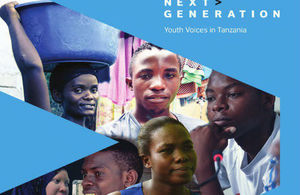UK-funded Next Generation Youth Voices Report Launched in Tanzania
Young Tanzanians are ambitious and positive about the Tanzania’s future, they want to be in control of their destiny; to attain their dreams they urge the Government, stakeholders and community at large to aid their journey. ‘Next Generation Youth Voices Tanzania' is a research study carried out by the British Council funded by DFID to uncover the attitudes and aspirations of Tanzania’s young population.

Next Generation launching
‘Next Generation Youth Voices Tanzania’ is a research study to uncover the attitudes and aspirations of Tanzania’s young population. The study, funded by the UK Department for International Development (DFID) was launched on 26th July, 2016 at Karimjee Grounds in Dar es Salaam at a youth–led event attended by Guest of Honour, Jennista Mhagama, the Minister for Youth and British High Commissioner Dianna Melrose.
Tweeting from the event, the British High Commissioner wrote:
NextGenTz Youth are the change agents to power Tanzania forward. Don’t limit yourselves, make your dreams reality
‘Next Generation Youth Voices Tanzania’ report. Important to listen and act on their priorities #NextGenTz
With a new Government after the 2015 election, the report highlights the issues seen as priorities by young people in Tanzania and develops insights for policy-makers to help the country capitalise on the potential of its youth.
Naseeb Abdul Juma famously known as ‘Diamond Platnumz’, a leading young Tanzanian musician, gave his message as youth ambassador in support of the Next Generation Youth Voices Tanzania saying:
I am very honoured to be appointed as a Youth Ambassador for the Next Generation Youth Voices initiative in Tanzania. We are the Next Generation of Tanzania. Some of the challenges cannot be solved by us alone. We need the Government, Stakeholders, Communities and Families at large to listen to the voices of young people and intervene. Our youth voices matter a lot – we are the change makers and have the biggest potential to transform Tanzania and Africa in general.
Four (4) youth speakers- Rebeca Gyumi, Furahini Godlike, Nyamagesa Laban and Fortunatus Ekklessiah- participated in the youth panel session presenting the findings and recommendations.
The study reveals that while young Tanzanians share values of culture, peace, religion, family, education, health and employment, they are afraid of not being able to attain their dreams. Fifty-six per cent (56%) worry about ill health and disease, and others felt that financial insecurity could be a barrier to their success. Despite the fears, young people feel responsible of their lives, actions and success, majority mentioned to lack enough support from family and community members to pursue and achieve their dreams.
Young people also do not feel involved in decision making processes including decisions that affect their lives. Education ranks the top most priority among the young people interviewed. It is seen as a bridge to different opportunities: “Education is the key to success; with the right education I will be able to achieve my goals and have a bright future”.
On the other hand Seventy-one per cent (71%) of young people mentioned unemployment as a key challenge. Only four percent (4%) said they had information on existing youth policies and empowerment programmes. Young people without further education or employment see entrepreneurship as a possible solution and opportunity.
In response to the 2015 election, young people think that the top priority for Tanzania should be quality education. Education is believed to be the key to opening doors to different opportunities. One of the respondents said: “Education is the key to success, with the right education I will be able to achieve my goals and have a bright future”.
Speaking at the event, acting British Council Director said:
Over the course of the Next Generation Tanzania research, we have listened to more than 3,000 young people from across the country. We found energy, commitment and optimism for the future, but also uncertainty and concern. Young Tanzanians are aware of the challenges and are ready to contribute to the countries development”.